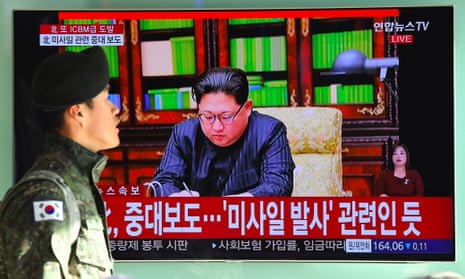North Korean leader Kim Jong-un and other officials should be prosecuted for crimes against humanity committed in the authoritarian nation’s camps for political prisoners, three renowned international jurists said Tuesday.
The jurists’ report is based on testimony from defectors and experts on the camps, believed to hold between 80,000 and 130,000 inmates. It cites evidence of systematic murder, including infanticide, and torture, persecution of Christians, rape, forced abortions, starvation and overwork leading to “countless deaths”.
The report, drafted with the International Bar Association’s support, is billed as an unofficial follow-up to a UN investigation in 2014 finding reasonable grounds to conclude crimes against humanity had been committed in North Korea.
The three judges have served on past international tribunals: Navi Pillay, a former UN high commissioner for human rights; Mark Harmon who served on a tribunal trying Khmer Rouge leaders in Cambodia; and Thomas Buergenthal, who survived Auschwitz as a child and was a judge on the International Court of Justice.
North Korea “continues to deny the very existence of these political prisons”, the report says. “Yet, detailed satellite imagery, as well as the corroborated testimony of scores of former prisoners and state actors with firsthand knowledge of the prisons, established the existence of this prison system, and the horrific practices that occur therein, beyond any doubt.”
The jurists conclude that 10 of the 11 internationally recognized crimes against humanity have been committed. They say many of the prisoners are family members of individuals accused of political wrongdoing – a form of collective punishment against “class enemies” that dates back to the 1950s. Such victims are subject to arbitrary detention, torture, summary execution or life sentences. Hundreds of thousands of inmates are estimated to have died in camps over the years, the report says.
Among the abuses reported: starving prisoners are regularly executed when caught scavenging for food; abortions being performed by injecting motor oil into the wombs of pregnant women, according to a former North Korean army nurse; and firing squad executions of prisoners who attempt to escape.
Crimes continue to be committed in the camps, and the judges conclude Kim, members of the state security department and prison guards are culpable. They call on the international community to initiate proceedings at International Criminal Court, or a special international tribunal, to hold them accountable.
Although international pressure on North Korea over its dire human rights record has escalated since the issuance of the UN report in 2014, there remains little chance of a referral to the ICC. China and Russia, permanent members of the security council with veto powers, oppose it.
UN rights chief Zeid Ra’ad al-Hussein told the council this week that North Korea’s leadership has cracked down further on human rights as tensions have escalated over its nuclear and missile tests, and “horrific” prison conditions have become more severe. He said the reported five secret political prison camps serve as “a powerful instrument of control”.
North Korea’s UN mission strongly condemned Monday’s meeting, calling it “a desperate act of the hostile forces which lost the political and military confrontation with the DPRK that has openly risen to the position of nuclear weapon state”. It called the human rights issue in the country “non-existent”.
